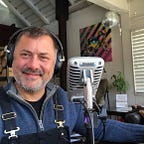The Creative Drive: If we’re at peace, do we stop making things?
In college my close friend Steve once suggested that a love of philosophical inquiry might have a lot in common with mental illness.
He said that by chasing after philosophical understanding we fail to accept the world precisely as it is, that the drive to understand and explain is a “dis-ease” with the present time and place. In his senior thesis at Bard College on the topic, he cited Freud, Nietzsche and Wittgenstein prominently to support this view.
I love the company of curious people. In fact, there’s little I respect as much as a person who has thirsted their whole life to understand two these two intertwined questions.
- What is the nature of consciousness?
- What is this human predicament and what should we do with it?
These are the seekers. Any deep dive they attempt is fascinating and there are a near infinite number of perspectives.
People who allegorically “wrestle with the angel” in this way often have wisdom to share and brim with insights. We may not agree in our understandings, but they have something to teach.
Conversely, there are many people who are perfectly happy skimming across the surface of life, engaged in superficial conversations and doing exactly what is expected of them, rather than forging a more uncertain path of new discoveries. I have a hard time relating to people like this, even if I sometimes envy their predictable happiness, their seemingly safe routines.
It can be similar with art.
The arts have been an obsession for me for most of my life. I co-founded and ran an international art gallery for 10 years and served 5 years on the board of The Yerba Buena Center for the Arts. I wanted to understand what it means to be human and what creative expression is and how it operates, both for the individual and society at large. After perhaps 15 years of concerted effort to understand and support artists I was saddened at what I perceived as an absence of intellectual and emotional integrity around the elite visual arts.
I experienced a similar process of disillusionment with poetry and the culture of poets in New York City, when I lived in Manhattan. Poetry is, in my opinion, the ultimate self-marginalizing art, somehow happy to be almost totally irrelevant to popular culture. And still, I love poetry and I love visual art and how they enrich my life and so many lives around me. And when I reflect on many of the people I most admire in this world, they are the outlier poets, writers and artists.
So I let go of the arts per se and went deeper, focusing specifically on the creative impulse.
What is creativity? Is it fundamental to every one of us? What is a genius? Is there such a thing? How might organizational creativity be cultivated?
Books like Guns, Germs and Steel and Where Good Ideas Come From pointed the way to an understanding that almost all creativity is collaborative, accretive (sole authorship is a convenient myth) and something we all have in abundance. We eat, shit, sleep and make things; at least most of us do.
But our social constructs and educational systems often employ shame, fear and perfectionism to silence our creativity. See this amazing TED Talk by Ken Robinson on this topic. This in turn also quiets us as appreciators of art and stifles the conversations art can inspire. It may even dampen our empathy. A robust diet of art has been proven as an effective tool to cultivate empathy.
Is the drive to make art, like the philosophical inquiry I mentioned at the outset, the output of our friction with the world? Is such friction then helpful?
If we are truly at peace with our circumstances, does the drive to make things evaporate, as the hunger to understand may evaporate with grace?
